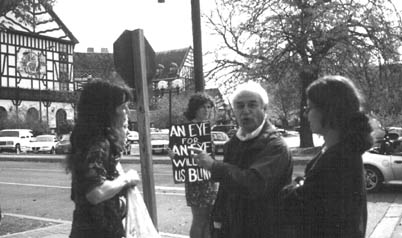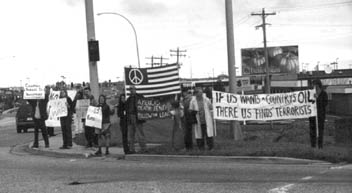|
 You
may have seen them outside the Urbana Post Office or
the Free Library or the Champaign County courthouse
during the lunch hour. Perhaps you’ve seen them at the
junction of North Prospect Street and I-74 in Champaign.
More recently, you might have caught sight of them on
University Avenue, across from Carle Hospital. You
may have seen them outside the Urbana Post Office or
the Free Library or the Champaign County courthouse
during the lunch hour. Perhaps you’ve seen them at the
junction of North Prospect Street and I-74 in Champaign.
More recently, you might have caught sight of them on
University Avenue, across from Carle Hospital.
At first they were a small group composed exclusively
of women, but now on a given day there may be as many
as 25 to 30 people of both genders. They range in age
from pre-teen to senior citizen, and in vocation from
student to teacher, factory worker tocomputer programmer
to college professor. They are your fellow citizens,
and they have been braving the elements and a seemingly
hostile political climate every weekday since September
20 to talk to you, their neighbors.
They are attempting to engage you in dialogue about
a subject that is very important both to them and to
you, in one of the few ways that are open to them. They
are standing outdoors along busy streets using signs
and banners and pamphlets to communicate their point
of view, and now they are communicating it in these
pages.
They are the Ladies and Laddies Against War, and they’d
like to make your acquaintance.
*****
Susan Parenti, an artist and teacher
at the School for Designing a Society, conceived the
original idea for the Ladies Against War in the aftermath
of September 11. A longtime student of language and
its relationship to politics, Parenti observed with
trepidation the mediaresponse to the events of that
day. She saw clearly that the US media’s extensive use
of emotion-laden language - what she calls the “pirating
of grief” - in framing the issue as an “Attack on America”
would contribute to a rapid militarization.
In those first days Parenti visualized “the slow movement
of a bully who has just been tapped on the shoulder”.
When she and some of her friends made small “No War”
banners which they pinned to their clothing, Parenti’s
“inner American” was frightened as she observed the
glares of her fellow citizens in response.
Within a week, Parenti had organized a small group of
women who resolved to make themselves available publicly
as a “Red Cross station for those who were suffering
from propaganda”. Initially the Ladies Against War stood
quietly outside the Urbana Post Office during the lunch
hour each day, dressed nicely and displaying anti-war
signs and banners. While they encountered a great deal
of hostility and verbal abuse, and even some scattered
incidents of physical violence, Parenti and her colleagues
discovered that a lot of their fellow citizens actually
wanted to unburden themselves. After screaming for a
bit, some of them would calm down and engage the Ladies
in dialogue about the events of September 11.
Another purpose of the Ladies’ demonstration, Parenti
relates, was to test the extent to which non-violent
protest was still protected by law in America following
the events of September 11. She cites one of her mentors,
Herbert Brun, who stated that he emigrated from Germany
in 1935 not so much because Germans were breaking Jews’
windows, but because the German police stood by and
did nothing.
In contrast, Parenti was assured by the Urbana police
that what she and her colleagues were doing was perfectly
legal, and the Ladies received ample police protection
from the very beginning. Parenti has nothing but praise
for the response of the Urbana Police Department.
Another positive discovery, Parenti recounts, was that
contrary to the media’s portrayal of reality, not all
Americans were in favor of the administration’s policies
in the aftermath of September 11. A number of cars bearing
American flags, she says, gave the Ladies the peace
sign as they drove past. While the responses they received
from African Americans were about 99% positive, the
Ladies observed that contrary to stereotype, women were
no more likely to express pacifist sentiments than were
men.
Sometime in October, the Ladies decided to move their
noon demonstration one day a week to the intersection
of North Prospect and I-74, and it was at that point
that they encouraged men to join them. Thus they became
the Ladies and Laddies Against War.
Parenti goes on to explain in greater detail the philosophy
underlying her decision to organize a public display
of dissent. She observes that the mainstream media has
been co-opted to such an extent that it has lost its
original focus as a watchdog on the excesses of government.
Instead, the press has become “Hollywood”, she feels,
so that rather than seeing the real news, we see a “movie”
about events. This movie is orchestrated in part by
the government in its propaganda efforts, and in part
by the corporations that own the media, in a complex
and incestuous web of deceit.
In this media climate, Parenti sees the Ladies and Laddies
Against War as a form of alternative newspaper. She
perceives dissent as a means of creating a “public space”
in which to “do democracy”, and emphasizes that with
democracy and dissent as with so many other things,
one must “use it or lose it”. She even encourages non-violent
disagreement, because disagreement leads to dialogue
which can lead in turn to greater mutual understanding
between people, and perhaps solutions to shared problems.
*****
If you ask them why they are there,
you will receive a number of different replies from
the Ladies and Laddies. There are recurring themes,
but these are themes not often or well articulated in
the mainstream media.
Many of the Ladies and Laddies, of course, want to communicate
their opinions to others. The signs and banners express
opposition to the bombing of innocent civilians in Afghanistan,
and concern for the impending starvation of potentially
millions more.The Ladies and Laddies feel that the atrocity
of September 11, while eminently tragic, does not necessitate
or justify further and greater atrocities against civilians
in countries overseas.
Scott Smith, age 30, is concerned about what he calls
the “ongoing cycle of violence.” He doesn’t have a magic
solution to all of the world’s complex issues, but he
understands that peace and justice have their origin
in the hearts and minds of individuals, and that the
solution to terrorism lies not in escalating violence
but in more spiritual approaches and perspectives.
David Green, a middle-aged husband and father with a
PhD in Education, is also concerned about the likelihood
of a war of uncertain duration against an ill-defined
enemy. He is afraid that the current war will not end
in Afghanistan or with the capture of Osama bin Laden,
but may well spread to Iraq, perhaps to Somalia and
other countries, as our nation’s leaders are emboldened
by their ‘success’ and attempt to extend American control
over the entire oil-producing region in the guise of
“fighting terrorism”. Green feels that until the American
public tires of war, he and others expressing dissent
both in Champaign-Urbana and throughout the world cannot
afford to grow complacent about war and starvation and
human suffering.
Green has not always been an activist. He was not vehemently
opposed to the war in Viet Nam, but he says that his
views on foreignpolicy have evolved over the past ten
years or so ashe learned more about the American government’s clandestine activities in
Central America and in the Middle East. About five years
ago, Green says, a “light came on” in his head and he
said to himself with something of a jolt, “We’re a fearsome
nation!” He feels that while ordinary citizens may be
sincere in their beliefs, the leaders at the very top
of the pyramid know that the real issue is control of
global resources, and don’t for a moment believe their
own rhetoric about “terrorists hating our freedoms".
the American government’s clandestine activities in
Central America and in the Middle East. About five years
ago, Green says, a “light came on” in his head and he
said to himself with something of a jolt, “We’re a fearsome
nation!” He feels that while ordinary citizens may be
sincere in their beliefs, the leaders at the very top
of the pyramid know that the real issue is control of
global resources, and don’t for a moment believe their
own rhetoric about “terrorists hating our freedoms".
next
page
|
|





